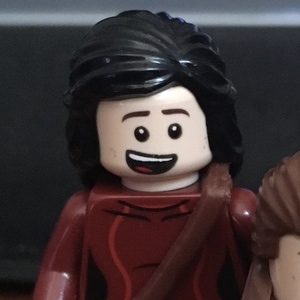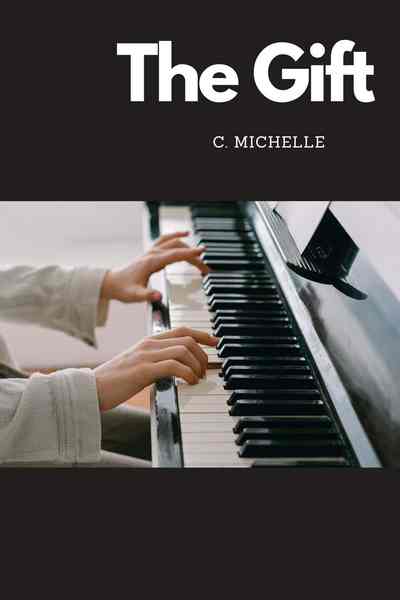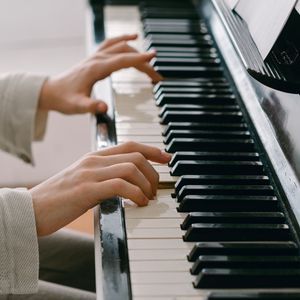The man sat stirring his coffee in the hospital cafeteria, thinking about what the doctor had said. "It won't be long now." He had an ache in his stomach he had never known before. A feeling of uncertainty and dread and foreboding. And pain. So much pain. Unbearable pain. Pain so great that he'd rather cut off his own arm than feel what he was feeling right now. Pain knowing he will watch her die. Pain knowing he will be left alone without her.
He felt someone sit down at his table.
Really? With all of the empty tables on the other side of the room?
He looked up at the new arrival and was physically taken aback. The man wore a white suit, and his hair and beard were long. Over his somewhat beady eyes he wore round-rimmed glasses. By all appearances, he was John Lennon. Of course, if John Lennon were still alive and it was circa 1969, which it was not. Nor was it October, so Halloween was out. The man looked around, but no one else seemed to notice. His wife would love this. She was a huge Beatles fan, and John was her favorite. He was more of a McCartney man himself. But John did sing the song they danced to at their wedding. "In My Life." He remembered how she looked that day, the beautiful fitted wedding dress that flared out at her feet and hugged her every curve, her dark blonde hair pulled up in a French twist with little pieces framing her face.
An image of her from less than an hour ago flashed in his mind and his stomach dropped and reality set in. The cold pit in his stomach returned, crowding out any warm feelings that had settled in.
John Lennon caught him staring at him and looked up from his food tray. "Oh, I'm sorry," he said in his thick Liverpool accent, which was unusual for this part of Texas. "Is this seat taken?"
"Uh, no. Please sit."
The man could not help but stare while John Lennon ate what appeared to be bangers and mash (since when did they serve that here?). There was no way this man was John Lennon, but he looked and sounded just like him. Like that face he made when he looked up from his plate again.
Embarrassed, the man busied himself with this coffee. "Sorry, you just look awfully familiar."
"I get that a lot," John Lennon admitted. "Common face." He paused for a moment, as if considering what he was going to say. "What're you in for?" he asked, like they were sharing a prison cell.
"My wife has cancer," the man admitted, though he always found it hard to say. "She has reached the final stages."
"Tough break, man. How're you holding up?"
"It hurts like hell and I would do anything to make it stop."
"Anything, huh?" John Lennon went back to his food, but his words hung in the air. It was an odd thing to say, and the man would be lying if he said he didn't feel a slight shiver, though he wasn't sure why.
"Well, not anything, but quite a lot," he felt the need to clarify.
"Right." Lennon gave a slight nod of the head. "If only we had a time machine, eh, mate? We could go back and change things so we wouldn't be where we are now, you know?"
"Yeah, but even a time machine can't change cancer," the man shook his head sadly.
"No, but what if you could change the hurt? Remove yourself from the situation. Go back in time and change one thing, so that when you return to the present, you don't remember ever changing a thing, and your life just goes on from there. There are no regrets. No guilt. You could eliminate unpleasant feelings in future. You could eliminate baggage. Imagine that." Lennon caught the man's eye with such intensity and enthusiasm that the man felt bad about bursting his bubble.
"I don't think that's quite how time machines are supposed to work."
Lennon seemed undeterred. "But say it did? Would you change anything?"
"I don't like answering questions like that."
"It's just a hypothetical, mate. Would you maybe go back and make it so you never met your wife? To stop the hurt?"
"Of course not! That would be wrong!"
"She wouldn't know and you wouldn't know. It would be just like starting over." John Lennon raised his eyebrows.
"I don't like where this conversation is going."
And it was at the moment that he was saved by his mother-in-law, who entered the cafeteria and stood, scanning the light crowd, presumably for him. He rose to get her attention, and then was about to excuse himself from his odd tablemate, but when he looked at the seat across from him, he found it empty. The tray was gone as well. But a stray napkin lay forgotten.
* * *
Sitting with his wife in her hospital room after hearing the results of more tests was not an easy thing to do. The man felt the coldness in the pit of his stomach radiate through his arms and legs. He felt as if a dark cloud suddenly threw a shadow across his face, and he hurriedly pushed the thoughts away before she could notice this change in him. He had always tried to look positive for her.
Her. His wife. The lifetime companion he had chosen for himself, unwitting to the fact that her lifetime was apparently much shorter than his own. She was visually upset, and though she was tired, she could not stop talking. She was like this when she didn't know what to do.
"What if the tests were wrong?" she said. "What if I'm not done with all of the things I'm meant to do here on Earth? You know, we're all sent here with a purpose."
Her words began to meld into a steady hum, and he found himself studying her appearance, as if this was the last time he would ever see her. She lay, propped up against a tuft of pillows, with breathing tubes in her nose, and her eyes blood-shot and tired, with dark circles beneath them. She had always had dark circles beneath her eyes – she never slept well, and she was so thin-faced. But now, they were nearly black, like the grease athletes wore beneath their eyes to counteract the glare of the sun. She had her last bits of hair pulled back and up in the beret he had bought her that winter in New York.
She had gotten it in her head that year that she wanted to see the Statue of Liberty and take lots of pictures. She was teaching an American Studies class to immigrants at the time, and wanted her students to be able to share in her first-hand knowledge of one of the country's great monuments. It was so cold in early January, and being from the South, they were not prepared for the northern wind and snow.
A boutique near the hotel had woolen women's hats on display. He had never seen her in a hat before, but he was concerned for her delicate pink ears, and his mother had always told him that a person loses more warmth through their head than anywhere else. So he purchased the hat while she was in the shower, and presented it to her upon her first shiver, exiting the building. Her eyes lit up, and she put it on right there, checking her appearance in every store window that they passed. She called it her New York Hat, and she wore it every chance she got.
And now she wore it because she had something to hide.
"What about children?"
"Huh?" He was drawn from his reverie. "You want to have children? But you're not well."
She sighed, and sank back into the pillows, looking as if she might cry. "I meant 'what if we were supposed to have children?' Haven't you been listening to what I've been saying? I should have known you weren't. You had that distant look in your eyes."
"I was hearing you, though."
"It's okay," she sighed. "I know you have a lot on your mind."
"Yes, I do." He looked at the walls and felt he couldn't stay there any longer, today. "I need to get home," he said, and as if to make an excuse, added, "The cats need to be fed."
She looked disheartened, but gave a weak smile. "I'll try to be here when you get back."
He smiled back and gave a sad, small laugh. "Okay."
He gave her a kiss on her forehead and left the room.











Comments (0)
See all